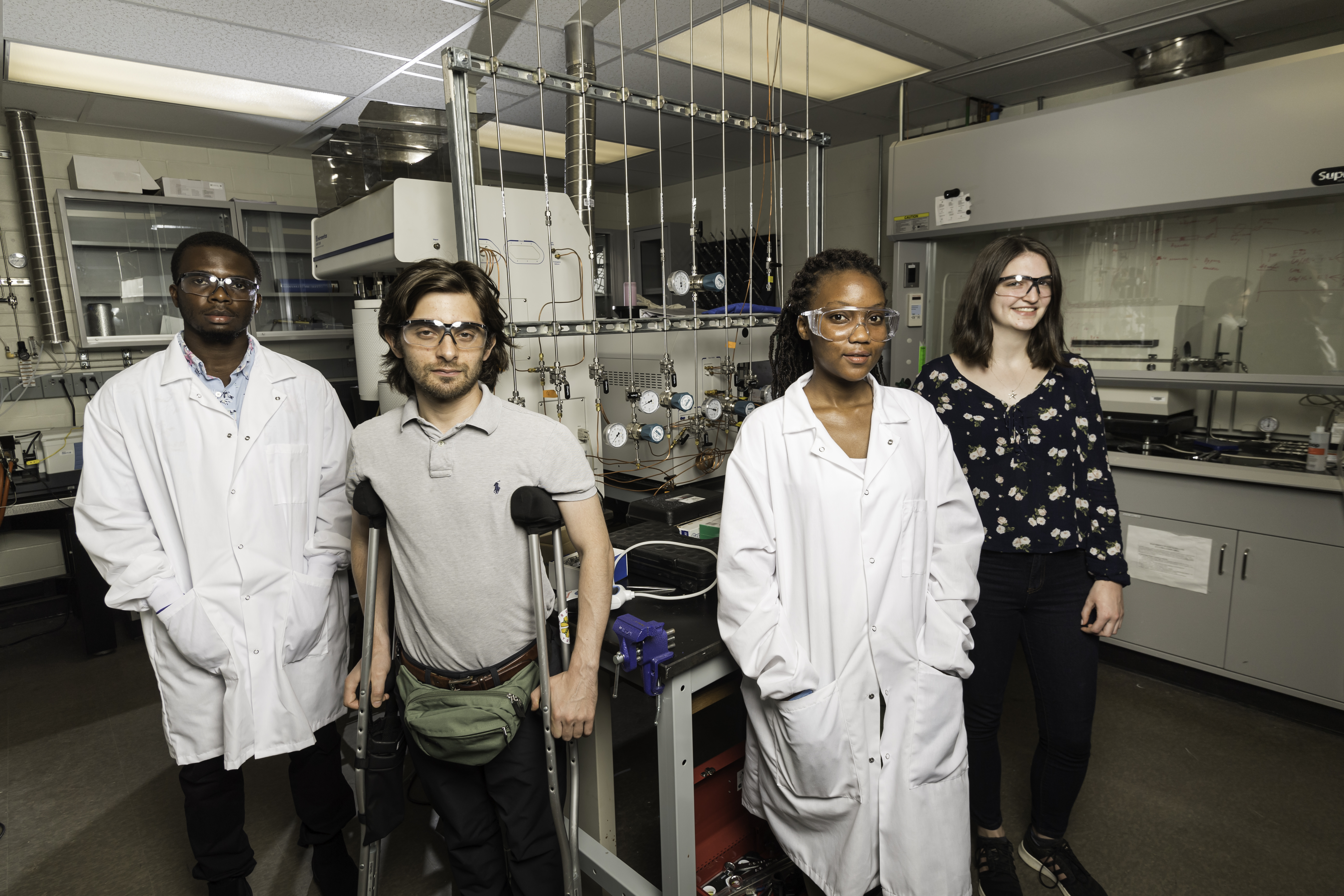Putting theory into practice in quest to convert CO2

It is all well and good to learn theories in the classroom, say three University of Rochester chemical engineering undergraduates working with Marc Porosoff this summer.
But they much prefer actually putting those theories into practice, which is exactly what they’re doing in the assistant professor’s lab.
Eve Marealle ’21 from Dar es Salaam, Tanzania; Aime Laurent Twizerimana ’20 from the Nyahibu District of Rwanda; and Madeline Vonglis ’20 from nearby Scottsville, NY, are all working on various projects associated with converting carbon dioxide for other uses.
Both Marealle and Twizerimana, for example, who are both Xerox Engineering Research Fellows, are looking at ways to convert carbon dioxide into ethylene and propylene, the two leading petrochemicals manufactured worldwide.
“Rather than use oil resources to make these commodity chemicals, we could use carbon dioxide instead,” says Porosoff.
Carbon dioxide has been identified as a major contributor to global warming. But even if it wasn’t, it would still be a prime target for this kind of research, Porosoff says.
“We have all this carbon dioxide in the atmosphere, and it would be a missed opportunity not to try to use it as a low-cost feedstock.”
Vonglis, an Eisenberg Summer Intern, is working on a different project. While Porosoff was doing his postdoc at the Naval Research Lab, he discovered that molybdenum carbide, used in conjunction with potassium, is a very good catalyst for converting carbon dioxide into carbon monoxide. The carbon monoxide could then be used in a process developed by the Navy to make synthetic jet fuel.
Vonglis is running experiments to further characterize the catalyst and determine “how hard can we push it,” Porosoff says. “This will be the first time someone has shown that this type of molybdenum catalyst can be used on an industrial scale.”
Different paths to exactly where they want to be
The three students followed different paths to reach the University. But they all agree the Porosoff lab is exactly the right place, teaching them exactly the right things, to prepare them for their future careers.
Vonglis, for example, “grew up knowing she would attend the University of Rochester.” Both of her parents work for the University. Originally, she contemplated majoring in biomedical engineering – until she heard about the green energy applications that chemical engineers pursue. “That’s something I’ve always been passionate about, so I switched,” she says.
This has been her first opportunity to work in a lab.
“I really like the research we are doing,” she says. “Direct conversion of carbon dioxide is exactly what I want to be doing and want to continue doing in grad school.”
“Getting to actually do reactor studies, rather than just learning the theory of it,” she adds, “helps make everything fall into place, and it makes so much more sense.”
Science is “something that has always fascinated me,” says Marealle, who has followed in the footsteps of her older sister Joyceline ’20, who is also studying chemical engineering at the University of Rochester; a school counselor also encouraged Eve to apply because of the university’s strength in research
This is also her first opportunity to work in a lab.
“In the classes we take during the academic year, we are learning knowledge that already exists,” she says. “I wanted to do research to get a new experience, and to learn how we can apply what we learn in the classroom. It’s been a great experience so far.”
She would like to get a master’s degree in energy systems, then either stay in the US and work for a company reducing the effects of global warming or return to Tanzania and start her own company to increase awareness of the problem in that country.
Twizerimana heard about the University of Rochester and its flexible curriculum while attending a gap year program called Bridge2Rwanda, which helps students apply for scholarships to schools in the US and Europe. He initially wanted to concentrate on industrial chemistry, which is not offered at Rochester, so he enrolled in chemical engineering instead.
That has worked out well, he says, because it has allowed him to explore a broader range of subjects.
He spent the first part of last summer doing research as an intern at the Forschungszentrum Julich research center in Germany, then joined the Porosoff lab last August.
His work in the lab has given him hands-on experience with synthesis techniques, characterization, and reactor studies – all of which are at the core of the catalysis studies he would like to pursue in graduate school.
“I’m interested in pursuing a PhD because there’s more I still need to learn,” Twizerimana says. “I am especially interested in alternative uses of carbon dioxide, because there are potential markets and potential applications to so many things.”
His “ideal dream”: Starting his own chemical company in Rwanda.
